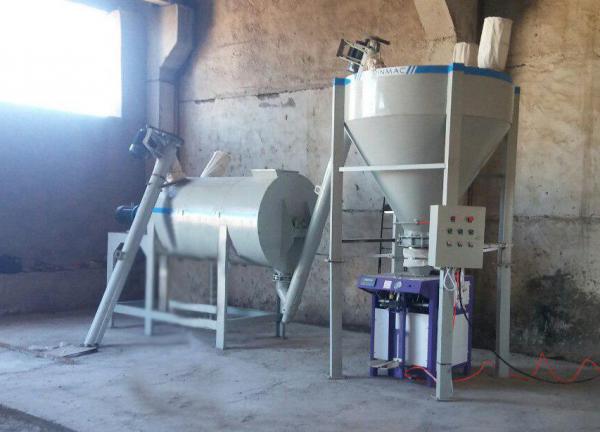
Industrial mixing equipment: process optimization in various industries
Industrial mixing equipment plays a key role in a variety of manufacturing processes, facilitating the mixing, homogenization and emulsification of liquids and powders in a wide range of industries. From chemical processing to food and pharmaceutical processing, these versatile machines ensure uniformity, consistency and efficiency in product formulations and material processing. In this article, we will take a closer look at the functions and applications of industrial mixing equipment, including agitators and mixers.
1. Industrial mixers:
Industrial mixers are dynamic mixing devices designed to mix liquids and suspensions in tanks, vessels and reactors. Key features and benefits of industrial mixers include:
- Versatility: Industrial mixers come in a variety of configurations, including paddle, propeller, turbine and anchor types, each tailored to specific mixing applications and process requirements.
- Effective Agitation: Agitators create mechanical agitation using rotating blades or impellers, creating turbulence and shear forces that help disperse and homogenize materials in liquids or suspensions.
- Customization: Industrial mixers can be customized with a variety of impeller designs, rotation speeds, and configurations to achieve desired mixing results such as mixing, solid slurry, gas dispersion, or heat transfer.
- Size and Capacity: Industrial mixers are available in a variety of sizes and capacities to accommodate a variety of batch volumes, from small laboratory vessels to large-scale industrial reactors and storage tanks.
- Process Control: Advanced mixing systems can include features such as variable speed control, automated control, and remote monitoring to accurately control mixing parameters and optimize the process.
2. Industrial mixers:
Industrial mixers are static mixing devices used to mix liquids, solutions and suspensions in tanks, containers and containers. Key features and benefits of industrial mixers include:
- Simple Design: Industrial agitators typically consist of a shaft-mounted impeller or mixing element that is immersed in a liquid or solution, creating a rotating motion to provide mixing and circulation.
- Low Maintenance Costs: The agitators are designed with a simple, reliable design with fewer moving parts, making them easy to install, operate and maintain with minimal downtime or maintenance requirements.
- Evenly Mixing: Although less aggressive than stirrers, industrial mixers provide gentle and consistent mixing to ensure even distribution of substances, additives or ingredients in a liquid medium.
- Economical: Agitators provide a cost-effective solution for basic mixing applications where high shear or intensive mixing is not required, providing reliable performance and cost-effectiveness at a lower investment cost.
- Compatibility: Industrial mixers are compatible with a wide range of vessels, including open tanks, closed tanks and batch reactors, making them suitable for a variety of process industries such as pharmaceuticals, cosmetics and water treatment.
3. Industrial mixers:
Industrial mixers cover a broad category of mixing equipment that includes batch mixers, continuous mixers, and linear mixers used to mix, emulsify, and disperse materials in the form of a liquid, powder, or suspension. Key features and benefits of industrial mixers include:
- Various Applications: Industrial mixers are used in a variety of industries, including chemical processing, food and beverage, cosmetics, pharmaceuticals and polymers, for a wide range of mixing applications.
- Process Flexibility: Industrial mixers provide flexibility in terms of batch sizes, mixing times and processing conditions, allowing for rapid changeovers, recipe adjustments and customization to meet specific product requirements.
- High Shear Mixing: Some industrial mixers are capable of high shear mixing, which involves intense mechanical forces and turbulence to achieve emulsification, dispersion, or particle size reduction in complex formulations or suspensions.
- Hygienic Design: Industrial faucets used in the food, pharmaceutical and sanitary industries are designed with sanitary features such as smooth surfaces, easy-to-clean design and CIP (clean-in-place) systems to ensure product purity and compliance with regulatory standards.
- Advanced Control Capabilities: Today's industrial mixers can offer advanced control, automation and integration capabilities to enable precise control of mixing parameters, real-time monitoring and data logging for process optimization and quality assurance.{88 }
Conclusion:
Industrial mixing equipment, including agitators and mixers, are essential tools for achieving efficient and consistent mixing in a variety of manufacturing processes and industries. Whether mixing chemicals, emulsifying food or dispersing pharmaceutical formulations, these versatile machines play a critical role in ensuring product quality, uniformity and process efficiency. As industries continue to evolve and demand higher standards of productivity and quality, the implementation of advanced industrial mixing solutions will continue to be essential to address manufacturing challenges, drive innovation, and maintain a competitive advantage in the global marketplace.






